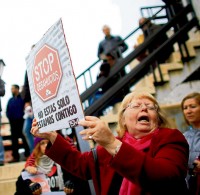Federal banking regulators are trumpeting an $8.5 billion settlement this week with 10 banks as quick justice for aggrieved homeowners, but the deal is actually a way to quietly paper over a deeply flawed review of foreclosed loans across America, according to current and former regulators and consultants.
To avoid criticism as the review stalled and consultants collected more than $1 billion in fees, the regulators, led by the Office of the Comptroller of the Currency, abandoned the effort after examining a sliver of nearly four million loans in foreclosure, the regulators and consultants said.
Latest news
- France begins eviction of 650 migrants from Calais camps
- Anti-eviction group creates crowdsourcing map for stories of displacement
- More foreclosures, more middle-aged suicides, study finds
- When it comes to hosting the Olympics, more cities are saying, ‘Hold that thought.’
- European leaders urged to end plight of 600,000 stateless people
Latest from the collection
- Raquel Rolnik’s mandate ends. Leilani Farha is the new rapporteur. – Newsletter #47
- Roots and Branches
- New Materials on Security of Tenure in Several Languages – Newsletter #46
- Guide: Guiding principles on security of tenure for the urban poor
- Address acute housing crisis – Special rapporteur on adequate housing
Learn more



